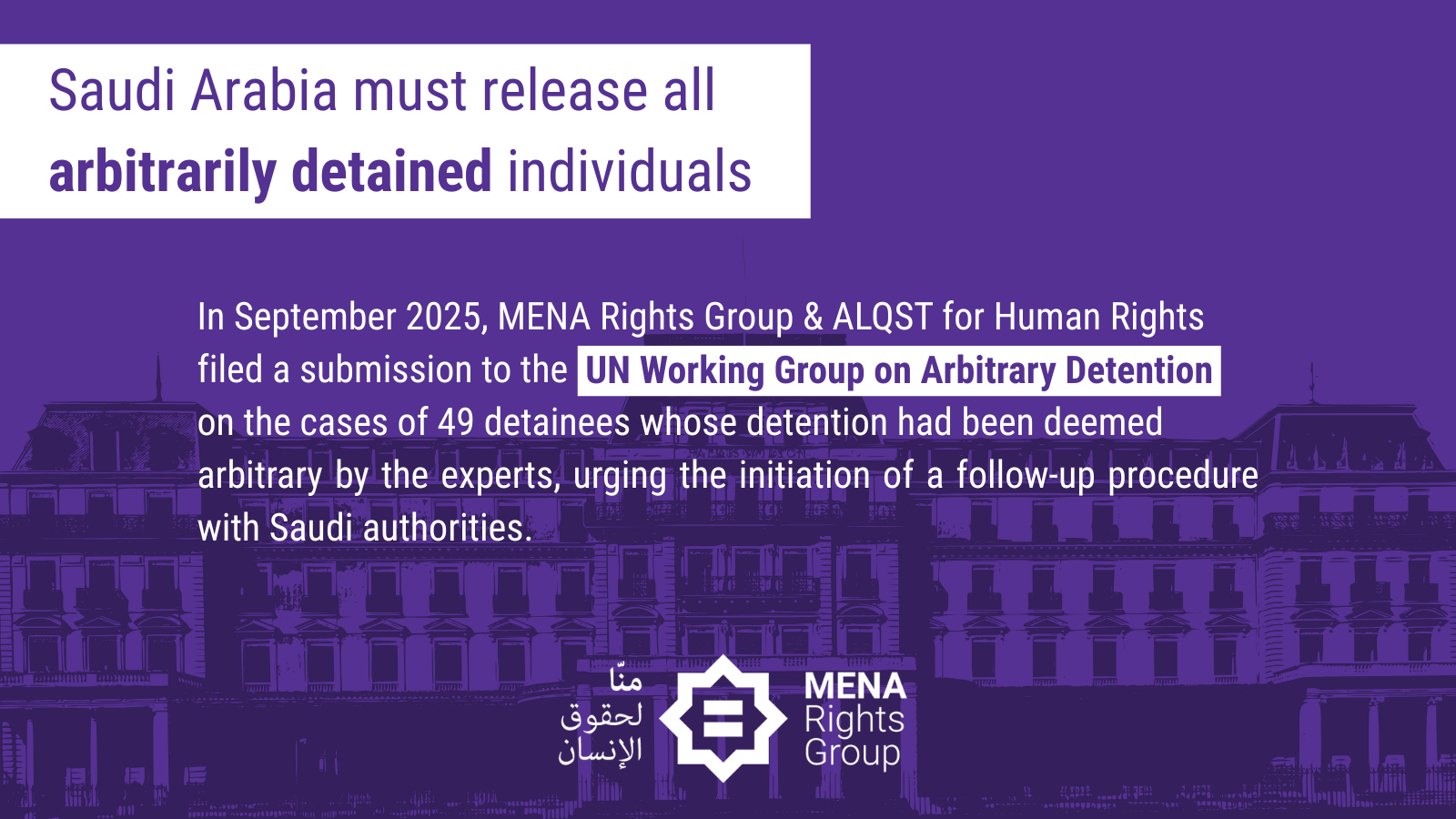September 16, 2025

Geneva, September 17, 2025 - For decades, Saudi authorities have continued to use the practice of arbitrary detention to crack down on all forms of peaceful dissent. In September 2025, MENA Rights Group and ALQST for Human Rights submit a communication to the UN Working Group on Arbitrary Detention (WGAD), urging the group of expert to initiate a follow up procedure on all Opinions addressed to the government of Saudi Arabia. In the past months, at least 44[1] political prisoners have been released from prison, presenting a rare opportunity for constructive engagement.
Since 2016, the UN WGAD has issued 33 Opinions pertaining to 49 individuals in relation to Saudi Arabia, each concluding that the cases involved amounted to arbitrary detention. In its Opinions, the WGAD expressed concern that the pattern of arbitrary detention in the country indicates a widespread or systematic problem, recalling that such practices may constitute crimes against humanity. MRG and ALQST for Human Rights have determined that none of the Opinions has been fully implemented so far, which undoubtedly enables systemic abuses to persist, and puts journalists, human rights defenders, peaceful government critics, and detainees’ families, at risk of further persecution.
In September 2025, MRG and ALQST provided written information on the status of implementation of all these Opinions to the WGAD, requesting the group of experts to issue a dedicated follow-up communication to the Saudi government, and recalling its obligations under Human Rights Council Resolution 51/8, which calls upon states to ensure effective remedies, provide reparations, and prevent further arbitrary deprivation of liberty. Through its follow-up procedure, the WGAD can engage directly with states to obtain information on measures taken to implement Opinions, highlight remaining obstacles, and draw international attention to cases of non-compliance.
Since early 2025, Saudi authorities have launched a wave of releases of political prisoners, including long-term detainees such as Mohammad al-Qahtani and Salma al-Shehab, offering a rare window of opportunity for engagement. However, despite these positive developments, civil society organisations have been documenting a simultaneous increase in death sentences and executions.
On August 21, 2025, the Saudi Ministry of Interior announced the execution of Jalal al-Labbad, a Saudi citizen who participated in demonstrations to protest against the treatment of the Shiite minority while he was still a minor. The WGAD had adopted an Opinion on his case, and four other minors on death row, in November 2024, urging Saudi authorities to release them. This sends a chilling message that Saudi authorities are not only failing to implement UN decisions, but going as far as implementing death sentences and carrying out executions.
Among the 49 individuals subject of WGAD Opinions, Abdelkarim Mohamed al-Hawaj, Mounir Abdullah Ahmad Aal Adam, Hussein Abo al-Kheir, Abbas Haiji al-Hassan and Jalal Labbad were executed following proceedings that failed to uphold international fair trial standards. Only five individuals have been conditionally released, often under continued surveillance, travel bans, or threats of re-arrest; while the other individuals remain in arbitrary detention. Full implementation of the Opinions requires the unconditional release of those arbitrarily detained and the removal of all restrictions on their freedom of movement.
For instance, Salma al-Shebab, a PhD student at the University of Leeds who was sentenced to 34 years in prison on vague counter-terrorism and cyber-crime charges for her social media activity, was recently freed by Saudi authorities in a surprising turn of events. Although she was released from detention, she remains subject to a travel ban that prevents her from leaving the country and pursuing her studies. Similarly, Mohammad al-Qahtani was finally granted conditional release on January 7, 2025, after spending 12 years in detention, including two years of enforced disappearance, due to his work in support of human rights, yet, he continues to face a 10-year travel ban that prevents him from reuniting with his family in the United-States.
These cases illustrate the gravity of the violations at stake and the urgent need for sustained engagement with Saudi authorities to achieve meaningful and lasting remedies. We call on Saudi Arabia to immediately and fully implement the Opinions and urge the WGAD to issue formal follow‑up letters to the government. It is high time that Saudi Arabia is held accountable for all those arbitrarily detained and fully cooperates with UN human rights mechanisms.
[1] This number includes the total number of individuals released since January 2025. Most of them are not object of Opinions of the WGAD.






